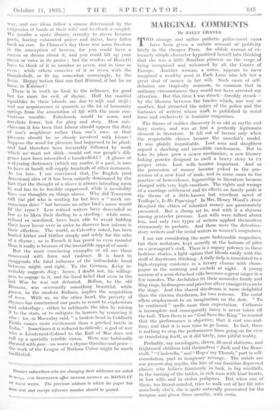MARGINAL COMMENTS
TWO strange and rather pathetic police-court cases have been given a certain amount of publicity lately in the cheaper Press. An oldish woman of ex- tremely simple character hypnotised herself into thinking that she was a little Bourbon princess on the verge; of being recognised and welcomed by all the; Courts ,. of Europe. Another woman, a nurse, appears to have imagined a wealthy aunt in Park Lane who left her a great deal of money in her will. Such cases of self- 'delusion are tragically Common, So common that in ordinary circumstances they would not have arrested my 'attention. But this time I was struck—fOrcibly struck-- by the likeness between the fancies Which, one way or another, bad attracted the notice of the police and the fantasies of writerS. whose work is published in . serial form and exclusively in feminine magazines.
The theme of sudden discovery is as old as myths and fairy stories, and was at first a perfectly legitimate element in literature. It fell out of favour only when the respectable classes became the novelist's model. It was plainly improbable. • Lost sons and daughters argued a shocking and incredible carelessness.' But to take its place grew a newer mechanism, a new literary baking powder designed to swell a heavy story to its proper crisis. Lost wills became important. And as the possession of money became yoked to the pos- session. of• a-new kind of rank, and in some cases to the practice of benevolence, legateeship in literature became charged with very high emotions. The rights and wrongs of a marriage settlement and its effects on family pride is the theme of a little-known but excellent novel of Trollope's, Is He Popenjoyr In Mrs. Henry Wood's Anne Hereford the ethics of inherited money are. passionately presented. • But a slump set in, and with it a shyness among genteeler persons. Lost wills were talked about less, and only two types of writers applied themselves strenuously to probate. And these were the detective- story writers and the serial writers in women's magazines.
I am not considering the more fashionable magazines, bilt their imitators, kept secretly at the bottom of piles on a newsagent's stall. There is a sugary potency in these bedtime stories, a light opium that blends easily with the stuff of daydream thinking: A daily-help is translated to a high-stepping existence in a luxury chorus with chain- pagne in the morning and orchids at night. A young matron of a semi-detached villa becomes a great singer ih a few minutes. The Archdukes fix their monocles firmly and fling rings, hydrangeas and priceless silver vinaigrettes on to the stage. And this shared daydream is more delightful than the cinema daydream, for two reasons. The serial offers employment to an imagination on the dole. " To De' continued " spells more than expectation. Catharsis is incomplete and consequently fancy is never taken off the boil. Then there is no "God Save the King" to remind that the performance is objective, that it cost one-and- four, and that it is now tine to go home. 'In face, there is 'nothing to stop the performance from going on for ever or translating itself, as it did lately, into pitiful reality.'
Probably, say sociologists, slaves, ill-used slatterns, and frightened children told themselves "Jack and the Bean- stalk," " Cinderella," and," Hop o' my Thumb," part in self- consolation, part in imaginary revenge. - The serials are our present-day myths, the lore of our feminine depressed elaises who, believe frantically in 'luck, in big windfalls, in the turning of the tables, in rich men with kind hearts, in lost wills and in stolen pedigrees. But when one of these, too literal7minded, tries to walk out of her life into somebody else's, she is. quite naturally prosecuted for the trespass and given three months, with costs.






























































 Previous page
Previous page